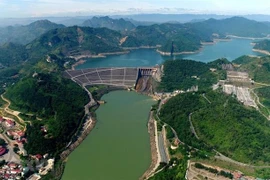 The Ministry of Industry and Trade (MoIT) directs EVN to prepare solutions in order to ensure electricity supply in 2020 (Photo: VietnamPlus)
The Ministry of Industry and Trade (MoIT) directs EVN to prepare solutions in order to ensure electricity supply in 2020 (Photo: VietnamPlus)
Hanoi (VNA) - The Ministry of Industry and Trade (MoIT) has directed the Electricity of Vietnam (EVN) to prepare solutions in order to ensure electricity supply in 2020, especially in the dry season.
According to Nguyen Anh Tuan, Director of the Electricity Regulatory Authority of Vietnam, said the drought and water shortages in many large hydroelectric reservoirs have put great pressure on the power industry.
In 2019, water in reservoirs is much lower than the expected level. For example, the Hoa Binh hydroelectric reservoir’s water level is less than 15m, while those in the Son La hydroelectric reservoir stands at 13m.
It is estimated that with the current water levels in reservoirs, the total output of electricity will be 4.4 billion kWh lower than that generated in case of the normal water level.
The MoIT, the Ministry of Agriculture and Rural Development (MARD) and the Ministry of Natural Resources and Environment had worked with relevant localities to seek measures to reasonably regulate and use water in hydroelectric reservoirs, Tuan said.
He added that along with inspecting in hydroelectric reservoirs, the MoiT has also proposed and coordinated with the MARD to discuss the most economical solutions for water use.
Currently, the Electricity Regulatory Authority of Vietnam has calculated high and low load scenarios, Tuan said, noting that the MoIT will propose a new directive on power saving in the coming time.
Regarding orientations for renewable energy development, Tuan stressed the need to harmoniously combine hydroelectricity, thermoelectricity, and renewable energy.
According to Tuan, Vietnam has recently focused on developing solar and wind power plants with a combined capacity of about 4,800 - 4,900 MW, which is a valuable source of energy that contributes to ensuring the nation’s power supply.
In January and February, hydropower reservoirs along the Red River will release more than 4 billion cu.m of water for the winter-spring harvest in the northern delta.
Renewable energy will supply about 10.8 billion kWh, equivalent to 4.16 percent, of power demand.
Nearly 2,000MW of wind and solar farms have yet to go into operation.
Due to the expected shortage of hydroelectricity, about 3.1 billion kWh of diesel-generated power will be used.
The MoIT has submitted a series of solutions to the Government to accelerate progress at these projects and asked EVN, the Vietnam National Coal-Mineral Industries Holding Corporation Limited, the Vietnam Oil and Gas Group and relevant agencies to ensure coal, oil and gas supplies.
The MoIT has also asked the EVN and other units to accelerate investment and construction at key power transmission projects including the Vung Ang-Doc Soi-Pleiku 2 power line.
To cope with prolonged droughts, the MoIT will work with the ministries of Natural Resources and Environment, and Agriculture and Rural Development to save water, invest in irrigation systems and store water to lower dependence on hydropower reservoirs.
Vietnam's National Power Transmission Corporation (EVNNPT) launched 36 power transmission projects with a total investment of 19.74 trillion VND (850 million USD) in 2019.
This marked the highest investment in the past three years and fulfilled 101.2 percent of the work assigned by the EVN.
Of the 36 projects launched, there were four 500kV power transmission projects and 32 220kV power transmission projects, said Nguyen Tuan Tung, General Director of the EVNNPT, a subsidiary of the EVN.
Among the projects were the 500kV Long Thanh substation, the 500kV Nho Quan Power substation, the 220kV Ninh Phuoc substation, the 220kV Thap Cham substation and the 220kV Lao Bao substation.
In 2019, the EVNNPT also put into operation 43 projects, including 11 500kV projects and 32 220kV projects, ensuring power supplies as required by the corporation and the EVN.
According to the EVN, this is an encouraging result as construction investment continues to face many difficulties, including prolonged procedures for investment preparations and complicated site clearance compensation settlements.
Last year, the EVNNPT approved 63 feasibility studies and 42 technical designs, selected contractors for 966 bidding packages worth 14.5 trillion VND, and selected online contractors for 461 bidding packages./.






























